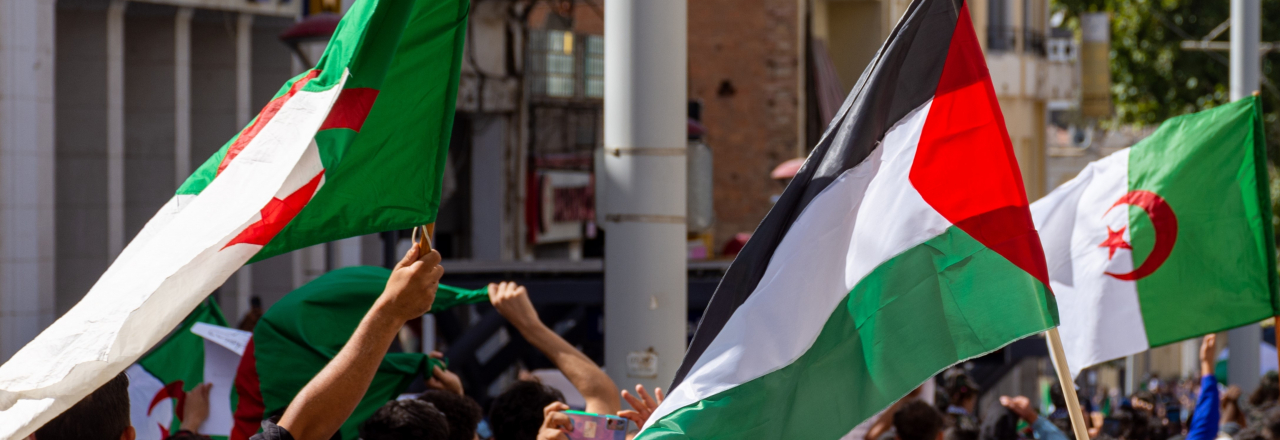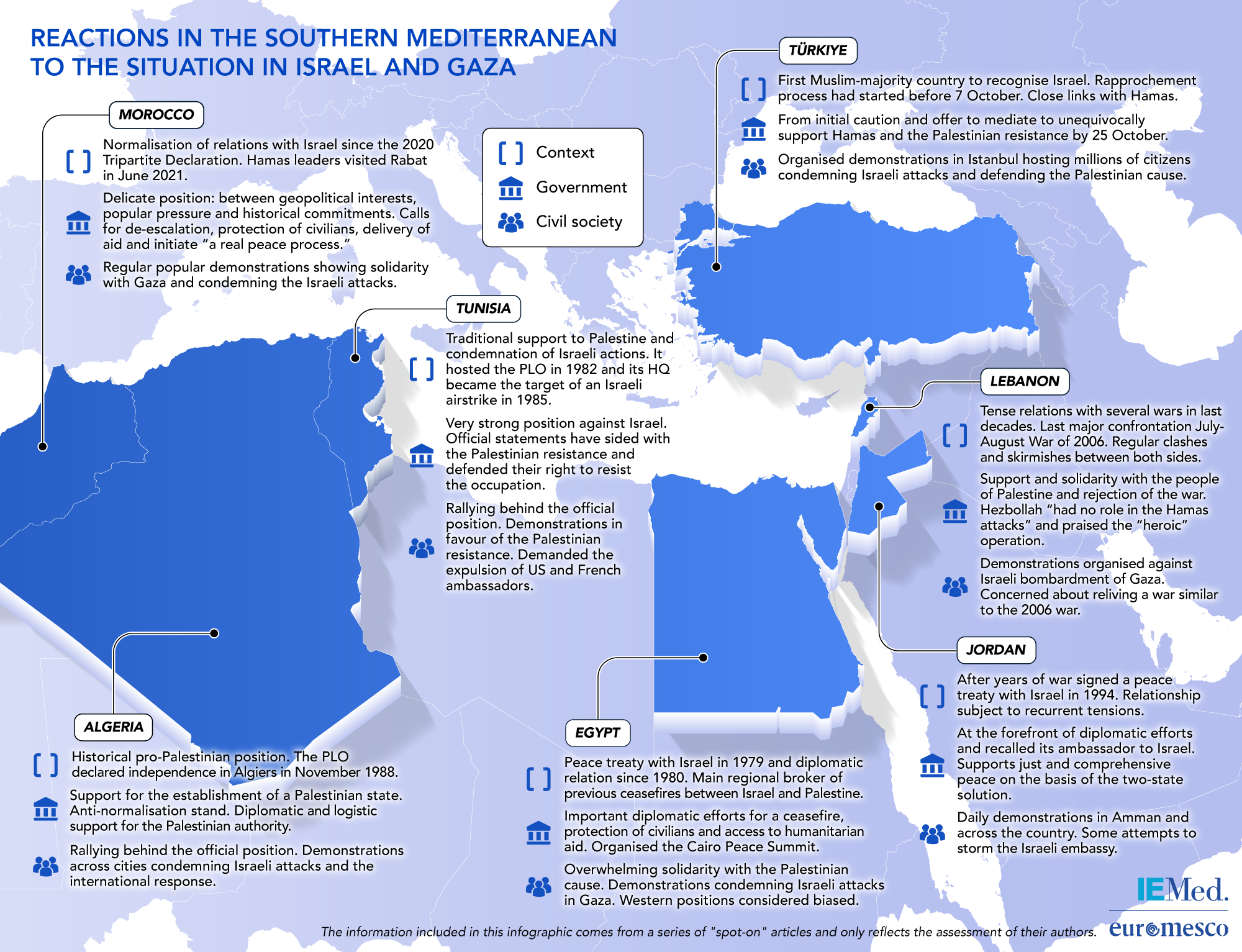

Abstract
Since 7 October, the Middle East is the scene of a major military escalation between Hamas and Israel in the strip of Gaza. Thousands of innocent civilians were victims of the ongoing conflict while the entire region is facing the risk of an expanded war. To make matters worse, international organisations are warning of a humanitarian catastrophe in Gaza as policy makers engage in shuttle diplomacy to revive the political process and prevent further deterioration of the situation. Algeria, like other states in the region, is following these events and standing by its historical pro-Palestinian position. As this war evolves over the next few weeks and months, its outcomes will shape Algiers’ foreign policy and rhetoric in addition to public sentiments regarding consequential geopolitical shifts and the security order in the region.
Introduction
On 7 October, Hamas launched a large-scale military operation against Israel. These attacks resulted in massive civilian casualties and triggered a wave of international condemnation especially from Western countries. On the other hand, countries in the European Union’s southern neighbourhood observed unfolding events with different perspectives. In Algeria, the ongoing war served as an opportunity for authorities to reiterate their position on the Israeli-Palestinian conflict and their support for the establishment of a Palestinian state in accordance with previous international resolutions and roadmaps including the Arab Peace Initiative. Moreover, the humanitarian crisis in Gaza received an important media coverage as Algerians took to the streets on 20 October to express their solidarity with the Palestinians and hold the international community and Arab states responsible. For Algiers, the latest episode of this conflict will constitute a strong motivation to embrace a harder anti-normalisation stand and step up diplomatic and logistical support for the Palestinian Authority. Popular distrust is also likely to increase regarding the reality of the rules-based order and the role of international organisations.
Official posture and diplomatic manoeuvres
Algeria’s relationship with Palestine is both historical and emotional. On 15 November 1988, leaders of the Palestine Liberation Organization (PLO) led by Yasser Arafat met in Algiers to announce the declaration of independence. Since then, Algerian authorities maintained a firm and solid political, financial, and diplomatic support for the PLO and advocated for an end to the Israeli occupation. In that sense, the Palestinian cause was always considered as a sacred dossier and the successive Algerian administrations rejected any concessions despite international pressure. In fact, current President Abdelmadjid Tebboune said in 2021 that Palestine is the “mother of all causes” and refused to join or endorse the Abraham Accords that, according to him and the majority of Algeria’s political class, fail to address the root causes of the conflict.
As news emerged about Hamas’ attacks, President Tebboune was swift to have a call with his Palestinian counterpart Mahmoud Abbas. As expected, other political leaders including at the Algerian parliament and across the political spectrum stood behind Algiers’ official position in condemning the Israeli occupation. Algeria’s Ministry of Foreign Affairs issued an official statement to condemn Israeli practices in Gaza and call upon the international community to “assume its responsibility”. This posture was further solidified in the wake of the attack on a Palestinian hospital which reportedly killed over 500 innocent civilians. Algerian authorities also sent urgent and significant humanitarian aid to Gaza through Egypt and refused to attend the Cairo Summit for Peace given the possible presence of an Israeli delegation. Algiers’ solidarity with Palestine extended to symbolic gestures including the suspension of the local football league and consulates’ celebrations of Algeria’s 69th anniversary of its liberation war.
Beyond momentary policies and acts of solidarity, it is safe to say that Algerian authorities will continue working on the Palestinian dossier. In October 2022 and prior to the Arab League summit, Algiers hosted reconciliation talks for Palestinian factions to end the ongoing divisions. While these efforts are unlikely to yield solid and durable Palestinian unity in the short-term, they showcase Algeria’s attachment to the cause. Furthermore, Algerian Foreign Minister Ahmed Attaf had multiple calls with his European counterparts to highlight Gaza’s urgent humanitarian needs and make the case for a renewed peace process in the Middle East. This diplomatic manoeuvring could be seen as a preview of Algiers’ foreign policy priorities ahead of its mandate at the United Nations’ Security Council (UNSC) which will begin in January. The Algerian diplomatic corps is expected to increase its lobbying for a full Palestinian membership at the United Nations (UN) which was declared as a major objective by President Tebboune.

Popular frustration and shifting geopolitics
Reactions to the ongoing humanitarian crisis in Gaza were also shared by the Algerian population. Following a general call coordinated by major political parties and civil society organisations, thousands of citizens marched across several cities and regions to condemn Israeli attacks and the perceived silence of the international community. Remarkably, these protests were the first since the COVID-19 pandemic and 2020 amendment of the constitution which put all demonstrations under strict state control. However, the Palestinian cause is one of the very few policy issues that enjoy consensus amongst all actors both within the Algerian political system and society. Also, protesters’ frustration was mainly directed at Western powers including the United States and European countries in line with a general sentiment across the region about what is seen as Western double standards.
The unfolding events in Gaza come amidst a renewed talk on normalisation processes between Israel and Arab states, most notably Saudi Arabia. Average Algerians stand behind the government’s official rejection of the Abaraham Accords and protesters illustrated this attitude by calling upon Arab capitals that have relations with Tel Aviv to expel Israeli Ambassadors. While the impact on the normalisation agenda is still unclear in the short term, Algerians are likely to keep note of both Arab and Western reactions and develop a more radical perception about these peace agreements. Meanwhile, local Algerian media coverage has also focused on these reactions and built on popular anger to question the impartiality of Western media outlets. There is a feeling in Algeria and the broader region that Western media tend to disregard Palestinian suffering given the fast-paced nature of this conflict.
Ultimately, popular reactions and media criticism will not move beyond these gestures not to cross authorities’ red lines. However, the current momentum offers a strong communication asset for the Algerian political system and especially the current administration. As Algeria is entering pre-elections mode in preparation for the 2024 presidential race, Palestine is likely to be an important campaign topic particularly for the current leadership. The Tebboune administration will capitalise on its anti-normalisation, pro-liberation rhetoric and policies to gain popular approval and generate support for the government’s public discourse. Understanding the centrality and importance of the Palestinian cause across the social and political spectrums, Algerian authorities will benefit from the population’s endorsement for their foreign policy and unconditional support of Palestinian factions.
While talks on the Abraham Accords will probably pick up after the end of the ongoing war, the price for normalisation will increase, and the Palestinian cause will remain a critical component of any upcoming deal. For countries that uphold a firm anti-normalisation stance such as Algeria, authorities will be more sceptical about the prospects of a genuine and just peace process even if there is little they can do to stop the latter. Hence, Algiers will alternatively consider that there are more pressing reasons to continue its support for the Palestinians all while leading an anti-occupation campaign at international organisations, especially the UN. Authorities will also seek to push forward multilateral actions and engage regional stakeholders including states and organisations like the Arab League and Organisation of Islamic Cooperation. In fact, Foreign Minister Attaf’s recent mission in New York aimed at coordinating joint plans with these organisations and find an urgent solution that would serve the humanitarian needs of the people of Gaza.
Conclusion
This war was marked by the significant wave of official and popular support for Palestine and a growing impression about Western double standards in applying human rights. As highlighted by Arab speeches including that of Jordanian King Abdullah II, Arab nations are calling upon their Western partners to avoid applying international accountability and humanitarian law in a selective manner. Such positions gain more significance amid a heated geostrategic competition between Western and Eastern camps and the ongoing Russo-Ukrainian conflict. Capitals like Algiers were already struggling to balance their calls to respect the UN charter and values with their longstanding relations with Moscow as they fell under Western pressures to condemn Russia’s actions. In that sense, the European reactions to the humanitarian situation in Gaza and Israeli retaliation to Hamas’ attacks will be evaluated carefully by Arab countries including Algeria. Failure to defend similar principled positions will jeopardize Europe’s reputation and make it nearly impossible for the Middle East and North Africa to understand Western concerns and demands about the Ukraine war. Furthermore, the ongoing war between Hamas and Israel may provoke a deep gap between Western and Arab priorities and policies.
Finally, it is safe to say that the results of the ongoing conflict will determine some aspects of the future of Algeria-Europe rapprochement. Recent months have witnessed increasing coordination between Algiers and European capitals on regional challenges and security issues. It is important to underscore the centrality of the Palestinian cause for Algeria’s foreign policy agenda and vision of long-term peace and stability in the region. Even if a sustainable solution to the Israeli-Palestinian conflict is still far and will be a complex task, Europe’s engagement will give clear signs about its impartiality and reliability as a solid foreign policy partner for Algeria. At the end, the Palestinian cause is here to stay as an undisputed and central concern for official and popular Algeria which will impact future policies, narratives, and strategic choices. Europe may have the possibility to consolidate its ties with Algiers in preparation for more coordination on security challenges at the UNSC, but that will require a humanitarian approach that listens to the region and its historical grievances.


